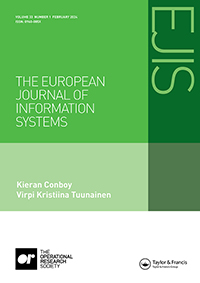The impact of cognitive biases on the believability of fake news
IF 8.6
2区 管理学
Q1 COMPUTER SCIENCE, INFORMATION SYSTEMS
引用次数: 0
Abstract
ABSTRACTModern technologies, especially social networks, contribute to the rapid evolution and spread of fake news. Although the creation of fake news is a serious issue, it is the believability of fake news and subsequent actions that produce negative outcomes that can be harmful to individuals and society. Prior research has focused primarily on the role of confirmation bias in explaining the believability of fake news, but other biases are likely. In this research, we use theories of truth and a taxonomy of 10 cognitive biases to conduct an exploratory, qualitative survey of social media users. Five cognitive biases (herd, framing, overconfidence, confirmation, and anchoring) emerge as the most influential. We then propose a Cognitive Bias Mitigation Model of methods that could reduce the believability of fake news. The mitigation methods are grouped according to three themes as they relate to the five biases.KEYWORDS: Fake newscognitive biasconfirmation biasbias mitigation modelmisinformationdisinformation AcknowledgementsThere is no financial conflict of interest. Data is available upon request from the authors. IRB (blinded). Research supported in part (blinded). We wish to thank the editor-in-chief as well as the anonymous review team for their helpful comments on an earlier version of this paper.Disclosure statementNo potential conflict of interest was reported by the authors.Notes1. This implies that the consumer of information has prior knowledge of, or a belief system about, the topics being consumed.2. The intermediate versions are available from the authors.认知偏差对假新闻可信度的影响
摘要现代技术,尤其是社交网络,助长了假新闻的快速演变和传播。虽然假新闻的产生是一个严重的问题,但假新闻的可信度和随后的行为才会产生对个人和社会有害的负面后果。之前的研究主要集中在确认偏见在解释假新闻可信度方面的作用,但其他偏见也可能存在。在这项研究中,我们使用真相理论和10种认知偏见的分类法对社交媒体用户进行了探索性的定性调查。五种认知偏见(从众、框架、过度自信、确认和锚定)是最具影响力的。然后,我们提出了一个认知偏见缓解模型的方法,可以降低假新闻的可信度。缓解方法根据与五种偏见有关的三个主题进行分组。关键词:假新闻认知偏差确认偏差缓解模型错误信息虚假信息确认不存在财务利益冲突数据可根据作者的要求提供。IRB(失明)。研究得到部分支持(盲法)。我们要感谢主编以及匿名评审小组对本文早期版本的有益评论。披露声明作者未报告潜在的利益冲突。这意味着信息的消费者对所消费的主题有先验知识或信念体系。中间版本可从作者处获得。
本文章由计算机程序翻译,如有差异,请以英文原文为准。
求助全文
约1分钟内获得全文
求助全文
来源期刊

European Journal of Information Systems
工程技术-计算机:信息系统
CiteScore
23.10
自引率
4.20%
发文量
52
审稿时长
>12 weeks
期刊介绍:
The European Journal of Information Systems offers a unique European perspective on the theory and practice of information systems for a global readership. We actively seek first-rate articles that offer a critical examination of information technology, covering its effects, development, implementation, strategy, management, and policy.
 求助内容:
求助内容: 应助结果提醒方式:
应助结果提醒方式:


